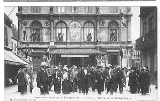
Declaration of Boulogne
Encyclopedia
The Declaration of Boulogne (Bulonja Deklaracio) was a document written by L. L. Zamenhof
and endorsed by the attendees of the first world congress of Esperanto
in Boulogne-sur-Mer
, France
in 1905. It defined "Esperantism" as a movement to promote the widespread use of Esperanto as a supplement to natural languages
in international and inter-ethnic contexts, not as a substitute for them within their proper realm. It declared that the Esperanto movement as such is politically and religiously neutral. It noted that Esperanto is in the public domain
and anyone can use it however he likes, as the creator of the language resigned his rights to it at the beginning. It said that the only obligatory authority for Esperanto speakers is the Fundamento de Esperanto
(a collection of the early grammar, dictionary and sample text documents), which all speakers of the language are recommended to imitate for the sake of stability in the language. Finally, it defined an "Esperantist" as someone who knows and uses the language Esperanto for any purpose.
L. L. Zamenhof
Ludwig Lazarus Zamenhof December 15, 1859 – April 14, 1917) was the inventor of Esperanto, the most successful constructed language designed for international communication.-Cultural background:...
and endorsed by the attendees of the first world congress of Esperanto
Esperanto
is the most widely spoken constructed international auxiliary language. Its name derives from Doktoro Esperanto , the pseudonym under which L. L. Zamenhof published the first book detailing Esperanto, the Unua Libro, in 1887...
in Boulogne-sur-Mer
Boulogne-sur-Mer
-Road:* Metropolitan bus services are operated by the TCRB* Coach services to Calais and Dunkerque* A16 motorway-Rail:* The main railway station is Gare de Boulogne-Ville and located in the south of the city....
, France
France
The French Republic , The French Republic , The French Republic , (commonly known as France , is a unitary semi-presidential republic in Western Europe with several overseas territories and islands located on other continents and in the Indian, Pacific, and Atlantic oceans. Metropolitan France...
in 1905. It defined "Esperantism" as a movement to promote the widespread use of Esperanto as a supplement to natural languages
International auxiliary language
An international auxiliary language or interlanguage is a language meant for communication between people from different nations who do not share a common native language...
in international and inter-ethnic contexts, not as a substitute for them within their proper realm. It declared that the Esperanto movement as such is politically and religiously neutral. It noted that Esperanto is in the public domain
Public domain
Works are in the public domain if the intellectual property rights have expired, if the intellectual property rights are forfeited, or if they are not covered by intellectual property rights at all...
and anyone can use it however he likes, as the creator of the language resigned his rights to it at the beginning. It said that the only obligatory authority for Esperanto speakers is the Fundamento de Esperanto
Fundamento de Esperanto
The Fundamento de Esperanto is a book by L. L. Zamenhof, published in the spring of 1905. On August 9, 1905 it was made the official source for the language by the fourth article of the Declaration of Boulogne at the first World Congress of Esperanto in Boulogne-sur-Mer, France:It is considered...
(a collection of the early grammar, dictionary and sample text documents), which all speakers of the language are recommended to imitate for the sake of stability in the language. Finally, it defined an "Esperantist" as someone who knows and uses the language Esperanto for any purpose.
External links
- The Declaration of Boulogne in English and Esperanto

